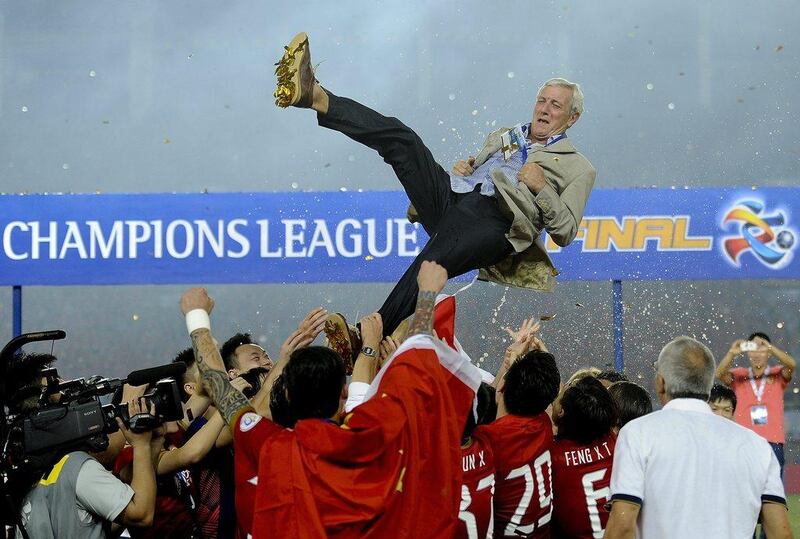GUANGZHOU, China // Marcello Lippi says Guangzhou Evergrande’s AFC Champions League win is a major boost for Chinese football, ending a drought for the nation’s clubs stretching back nearly a quarter of a century.
The World Cup-winning Italian coach, who already has multiple league titles and a Uefa Champions League win on his impressive CV, wrote his name into Chinese football history with the win on away goals after a 1-1 second leg home draw against FC Seoul on Saturday.
Evergrande reached the AFC final in impressive form, smashing eight goals past their semi-final opponents, Japan’s Kashiwa Reysol, after scoring freely throughout the tournament. They drew the first leg of the final 2-2 in Seoul.
“Winning this cup is very important for Chinese football,” said the silver-haired Lippi, now eyeing an unprecedented continental and domestic treble after romping to the league title in his first full season at the helm.
“From our side, we grew a lot and we tried to reach this level of being able to compete at international level with other teams.”
“We won again this year (the Chinese league), which is something positive for Chinese football and for Guangzhou Evergrande,” the 65-year-old added.
“We were able to do this two years in a row so the thing that we missed out last year that we recuperated this year is enough effort and will to win the Champions league.”
The last Chinese side to rule Asia were Liaoning, who won the former Asian Club Championship in 1990, before the long barren spell for China’s clubs.
Lippi’s men, who stormed to their third Chinese title, losing just one game and finishing a yawning 18 points ahead of runners-up Shandong Luneng, face Beijing Guoan in the domestic FA Cup semi-finals later this month.
Pundits have labelled Evergrande “the Manchester United of Asia” after the club emerged as a dominant force both at home and abroad, recovering from their relegation in 2010 for match-fixing.
Lippi joined Guangzhou last year after Korean Lee Jang-Soo had laid the groundwork for their resurgence and he has now won the top club competitions on two continents after success with Juventus in 1996.
South American flair – in the form of Argentine Dario Conca and Brazilians Elkeson and Muriqui – along with the bulk of the Chinese national team, have also helped Guangzhou reach the summit of Asian football.
And with the continued financial backing of one of China’s biggest property developers, Evergrande Real Estate Group, Lippi’s men will be looking to make an even bigger impact on the international stage.
Their Asian title gives Evergrande a place in December’s intercontinental Club World Cup in Morocco, when their reputation as an emerging “superclub” will be tested against the likes of Bayern Munich.
Football fans across China celebrated the victory but some cautioned that it had little bearing on the fortunes of the struggling national team.
The win for coach Marcello Lippi’s big-spending side sparked joy in China, with more than 13,000 people posting on the club’s official microblog. Most offered congratulations to the Chinese Super League champions.
“We’re confident to see the future of Chinese football because of you Evergrande,” a fan using the handle Yanjin Robert said in an Internet posting.
But some fans said the victory would do little to help the national side, which failed to qualify for next year’s World Cup in Brazil and are languishing at 97th in the world rankings.
“Even the Evergrande championship won’t change the third-class level of Chinese football. Chinese football will remain an onlooker in next year’s World Cup,” said Yang Er on his microblog.
“The Evergrande championship represents the pride of China, but does not stand for the level of Chinese football. Be more objective and calm down, get excited when we’re really stronger,” he added.
China finished behind Iraq and Jordan in their qualifying group for the 2014 World Cup, failing to make it through to the final stage of Asian qualifying.
Chinese football has also been tainted by years of corruption involving officials, referees and players.
A three-year investigation into match-fixing led to 33 people being banned for life and the Shanghai Shenhua club being stripped of the 2003 league title earlier this year.
Another fan added a sour note to the celebrations, saying the moneybags club had bought their success.
“Evergrande does not prove anything except they’re rich. They ‘purchased’ the coach and all key players of the team,” Ai Li Ze said.
“Is an Asian championship worth such high-profile celebration? We can’t even get an entry ticket to the World Cup.”





